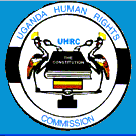The Uganda Human Rights Commission (UHRC) was established under the 1995 Constitution of the Republic of Uganda. The decision to establish a permanent body to monitor the human rights situation in the country was in recognition of Uganda’s violent and turbulent history that had been characterized by arbitrary arrests, detention without trial, torture and brutal repression with impunity on the part of security organs during the pre and post independence era.
Commission’s Functions
Article 52 (1) of the Uganda Constitution lays down the following functions of the Commission:
- To investigate, at its own initiative or on a complaint made by any person or group of persons against the violation of any human right;
- To visit jails, prisons, and places of detention or related facilities with a view of assessing and inspecting conditions of the inmates and make recommendations;
- To establish a continuing programme of research, education and information to enhance respect of human rights;
- To recommend to Parliament effective measures to promote human rights including provision of compensation to victims of violations of human rights, or their families;
- To create and sustain within society the awareness of the provisions of the Constitution as the fundamental law of the people of Uganda;
- To educate and encourage the public to defend this Constitution at all times against all forms of abuse and violation;
- To formulate, implement, and oversee programmes intended to inculcate in the citizens of Uganda awareness of their civic responsibilities and an appreciation of their rights and obligations as free people;
- To monitor the Government’s compliance with international treaty and convention obligations on human rights; and
- To perform such other functions as may be provided by law.
Article 52 (2) also requires the Commission to publish periodic reports and submit annual reports to Parliament on the state of human rights and freedoms in the country.
